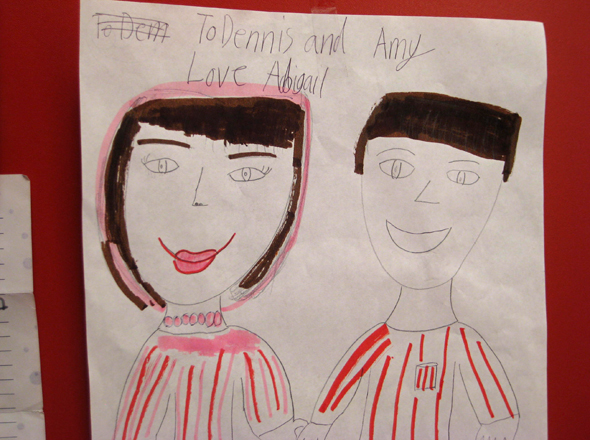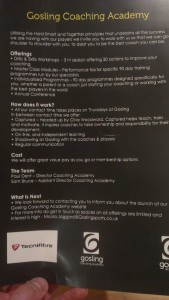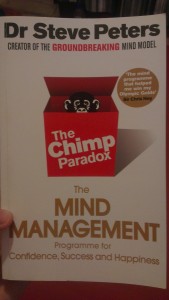Why Men are stupid and Women don't take risks
Well hopefully I’ve grabbed your attention. It’s true….well according to Dr Steve Peters any way!
On the 3rd September I had the privilege to hear Dr Steve Peters talk at the inaugural Gosling Coaching Academy Seminar that was organised by Gosling Coaching Academy Director, Paul Dent.
Dr Steve Peters came to talk to us about the ‘Chimp Model,’ a mind model for teaching people to understand how the mind works in practice to maximise sports performance. The Chimp Model is explained in general terms in his book The Chimp Paradox and focusses on everyday personal mind management not just sports performance.
In his highly entertaining and witty 4 hour seminar we covered a lot of interesting topics including:
- Knowledge & Understanding of how the brain works
- Differences between the Male and Female brain
- Why sport can be psychologically traumatic for a child- and other interesting facts about childhood
- Why commitment is more important than motivation
Obviously we weren’t allowed to film it because the seminar gave us insights into his work with athletes he has consulted with in the last 13 years including British Cycling and Gold medallist Sir Chris Hoy, British Taekwondo, UK Athletics, Liverpool FC and England National Football Team.
But I sent out a fair few tweets (@APAcoachDaz) so I could come back to them later and discuss them!
Top 10 Key points:
1. Be Realistic
The mind is just like a muscle in that it needs training. But psychology is no different than physical training. You wouldn’t ask a Strength & Conditioning coach to take an athlete with average fitness level and in a few weeks make them have Olympic levels of fitness. And yet this is what sports coaches think sport pysch coaches are going to do.
”You can only ever try to tilt the probability of optimising someone’s potential in their favour. You can’t guarantee anything!”
At the same time DON’T underestimate the importance of the mind. When he was first asked to work with British Taekwondo he asked a group of coaches how much importance the mind had on winning during a fight. The coaches estimated anything from 45-90%. When he asked how much of their training did they focus on mental skills they said ‘none.’ While this might seem stupid, the coaches simply explained they didn’t know how to do it!
2. Men are stupid and Women don’t take risks
The brains of men and women are different. There is a part of the man’s brain that is apparently four times smaller than in women- which we call the stupid gene. But women also have different neural circuity which makes them less likely to seek out risk and need more information and reassurance before going into certain situations, especially threatening ones. Men don;t calculate risks as much as women and just go right on in!
Dr Steve Peters said that in his time in British cycling they got the best results when they appointed a new coach who had more empathy with the female athletes than the previous coach who just put the fear of life in them. He told the story of his first experience working with the women’s team, where at that time the previous coach was having difficulties getting improvements in performance. Dr Steve Peters decided to sit the team of women down in a circle and spend 10 minutes asking them what was on their mind.
After about 10 minutes of expressing their worries and fears about being dropped from the team if they didn’t work hard enough apparently they all felt more calm. According to the coach at that time, they had the best training session EVER! Unfortunately he didn’t stick around to see the power of ‘exercising your chimp’ as they replaced him with someone who was more empathetic.
It just goes to show that some women will feel better if they have the chance to express their fears and get reassurance before they perform. This is not to say all women need this, as some of the females in the group just wanted to get on the bike straight away and be told at the end what they needed to do to improve!
3. Young Children are God!
Peters took us through a fascinating explanation of child social development. In the early years 0-2 years the child doesn’t really have a concept of their parent. They just see them as a person who meets their needs. They bring them food and water etc.
If you ask a two year old why the sun goes down, they will say: ‘because I’m tired and I need to sleep!’
At the terrible twos you get a child who is coming to terms with the fact that they are NOT God and they are developing a concept of the parent, and start to see that they are more important. In time they will become completely dependant on the parent and for a while will only feel safe if they are at their parent’s side.
Then you get the teenager years where the adolescent starts to rebel against the parent and seeks approval from the peer group. While this can be incredibly stressful for the parent, as the child has very little concept of risk, this is normal and healthy. It would be more worrying if the teenager was still dependant on the parent.
Finally you get to that stage of Mental Maturity (which many of us never reach) where we can be completely healthy emotionally independent of anyone else. For many of us we still need the security of other people to give us a sense of emotionally stability.
4. Sport is a contradiction
We are taking people conceptually out of society and taking them back into the jungle and asking them to compete for survival.
Our primal instincts are designed to help us survive in the jungle, with the threat of hunger and attack from other predators being constantly present. We developed drives for food, water, security, and sex and we would do whatever it took to have these things. In our modern world we have developed rules with expected behaviours based on morals and beliefs about what is acceptable to society.
The Human part of the brain does not seek these primal desires. But when you take a child and put them into a competitive sport environment it is like sending them back in the jungle. If the child does not have the mental capacity to handle this situation then it can be extremely traumatic. What is even worse is when the parent and/or coach adds to this stress by valuing winning at whatever cost- in Dr Steve Peter’s view this is plain and simple NEGLECT and Abuse!
5. Don’t put the picture on the Fridge door

Dr Steve Peters told of how Approval is the worst preoccupation of the Human mind. We shouldn’t try to live for the approval of others and rather focus on being happy in having done our best.
The problem is we teach our children from a young age to do things for approval. We collect them from school and they show us this nice picture they have drawn for us at school! What do we do? We praise them for drawing such a nice picture and then tell them it is so good we will put it on the fridge door. We even try not to hurt their feelings by pretending to know what the things are they actually drew.
What we should do is immediately put the picture to one side and firstly praise them for being such a wonderful child and give them a big hug. Then after we have done that we can then look at the picture and make a comment, but be honest and if you can’t tell what something is then tell them! It will better prepare them for the real world.
6. Take responsibility for your Actions
We are all prone to emotional outbursts where we let our emotions get the better of us!
This clip was shown which highlights what can happen when our Chimp gets out!!!
Needless to say the need to express the emotion of the chimp is 5 x more powerful than the logic of the human part of the brain whose role it is to rationalize the situation. The only way to change this is to programme the computer with lots of facts and truths about life that will give the chimp evidence that will calm it down. More on this in the next point.
The key point here though is that you may not be responsible for the traits of your emotional chimp BUT you are responsible for managing it. No excuses for poor behaviour!!!!
7. Life’s a Bitch
You need to programme the computer- this is where the chimp looks for evidence that stops it from jumping to conclusions. When you’re emotional you jump to conclusions- without first gathering truths and facts that might- had you known them- made you feel differently.
These facts and truths are statements about life that keep you on the right path, and give you perspective. Dr Steve Peters calls them your ‘Stone of Life.’
Mine are:
>Life is not fair
>The goal posts move
>Nothing is certain
8. Lessons on Communication
If you want to communicate better and avoid getting your chimp frustrated try this four part process to communicating. Dr Steve Peters used this with a member of his management company who he agreed to work with. This executive was complaining how his employees were stupid and never knew how to do what he asked. So Steve came in to observe a few meetings and discovered that the executive would say to the employee what he wanted them to do and then dismiss them from his office to go about their work. It turned out they had not clearly understood what the executive was asking of them!
Peters gave him this four point process and it worked a treat!
>Give them the message
>Check they heard it properly
>Check they understand why they are doing what they are doing
>Check they understand the consequences of doing it and NOT doing it!!
9. Do your best- The scout promise

Be proud of doing your best! Success in life is about being happy and this is a human value. It’s about putting in your best EFFORT.
The trouble is modern society puts expectations on us that we should achieve something, we should attain something especially wealth, fame, notoriety and status. This links to our need for approval. But this will always make you unhappy because you will never be satisfied.
10. It’s about Commitment not Motivation
You either want the job or you don’t! Overall we commit because we enjoy it! If the only reason to do something is because it is being rewarded then you’re just being motivated. Committed people do something because they enjoy it- in our job Strength & Conditioning is more than a Past time- it’s a Profession.
Motivation is like the adrenalin shot in the arm you get when you’re about to go into cardiac arrest. It has a powerful effect but it’s effects are over in a few minutes and you need another shot.
But commitment is a logical human drive to seek self fulfilment in doing something well and to the best of your ability. It gives you a sense of purpose.
Be Committed!!


